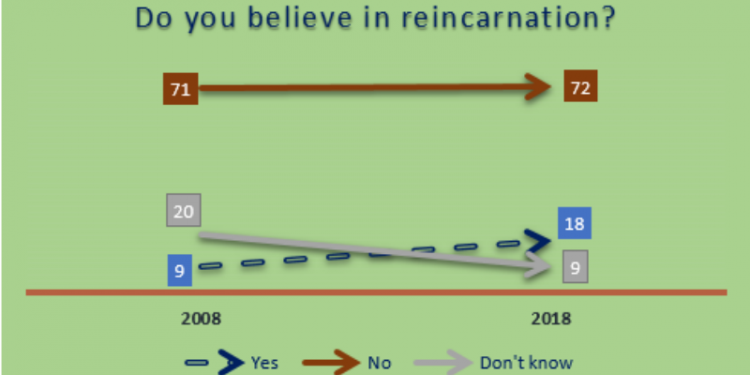Over the last ten years, the number of those who remain skeptical about a return trip to Earth after death remains the same, roughly seven out of ten. However, if we compare those who do believe in reincarnation, the number has doubled — from 9% in 2008 to 18% in 2018.
Based on the Drake Equation, our home galaxy The Milky Way hosts more than 20 alien civilizations. Consider that there are well over 100 billion galaxies out there, and there numbers will only increase as technology and telescope science continues to advance.
I am personally not very eager to return to this planet. It’s not because reincarnation contradicts the Christian narrative or because I have a cyclical view of life. It’s because I am not convinced that things would be better in Georgia during the “next time” around. I doubt I would be able to enjoy watching the Georgian national soccer team, breath clean air or eat domestically grown food. It’s unlikely that people will be driving and walking safer, elevators in apartment buildings will operate free or charge, dog owners will pick up their pets’ droppings on the streets and some international organizations will have transparent and professional procurement practices.
Belief in reincarnation varies country to country and depends on history, religion and cultural settings. For example, in the United States, the number is little bit higher than in Georgia and it is much higher in India and South Korea.
Based on the same survey, just over half of Georgians (56%) believe in hell. Heaven tops hell, with 70% of respondents stating they believe in heaven. These numbers are not drastically different if we compare the same beliefs among Christian majority countries.
First, it was theorized and later proved by numerous research studies that women tend to be more religious compared with men, especially Christian women. There are several good explanations for this: such women are less socialized and control less money and power; gender roles in society, historic traditions and some also emphasizes possible hormonal and neurological differences. The same differences could be found among beliefs of the younger and older generations, with younger people less religious compared to their elders.
While in Georgia women are also more religious, when it comes to believing in heaven and hell, younger people deviate from the global trend. The younger you are in Georgia, the more you believe in both heaven and hell. However, believing in these two promising afterlife destinations does not necessarily define religiosity of a person. We pollsters use more complex approaches by creating multidimensional questionnaires covering multiple factors of personal b e h a v i o r s such as frequency of praying, church attendance, belief in hell and heaven, ambiguity, Orthodoxy, knowledge of religious history, doctrines, etc.
So, why are young Georgians different? Is it generational? In developed democracies it is not.
This big gap between young and old is hard to explain without further statistical analysis of data and looking into historic surveys. We also need to compare Georgia with other Christian countries that had been under Soviet control.
Graph. How age affects belief in hell and haven and frequency of praying.

However, at this moment I think the “godless” generation of elderly people should have had some role to play in this. By “godless” I mean those who are over 50 years old and experienced a childhood where god was simply prohibited.
Georgians are different compared to their Western peers when it comes to believing in heaven and hell, but they are in step with Westerners in terms of data on frequency of praying. As Graph 2 shows younger people pray less compared to elderly respondents. I have two explanations for the latter. First, my generation compared to younger ones, does not listen too much to K-Pop, EDM, R&B and Art Punk, so we have better nerves and clean brains to pray. The second is that as you grow you became wiser and realize that you could have made a heaven on this earth, but something went wrong and you missed the train, so you start praying. Joking, joking…. Again, more analysis is needed and preferably a comparative one to at least understand the level of diverse approach young people take to metaphysical matters and how the older generation was damaged by the godless Soviet ideology.
Note: I would like to extend special appreciation to Ani Lortkipanidze who assisted with the analysis and charts featured in this article GORBI is an exclusive member of the Gallup International research network and has more than two decades of experience in survey research (gorbi.com)

































Discussion about this post